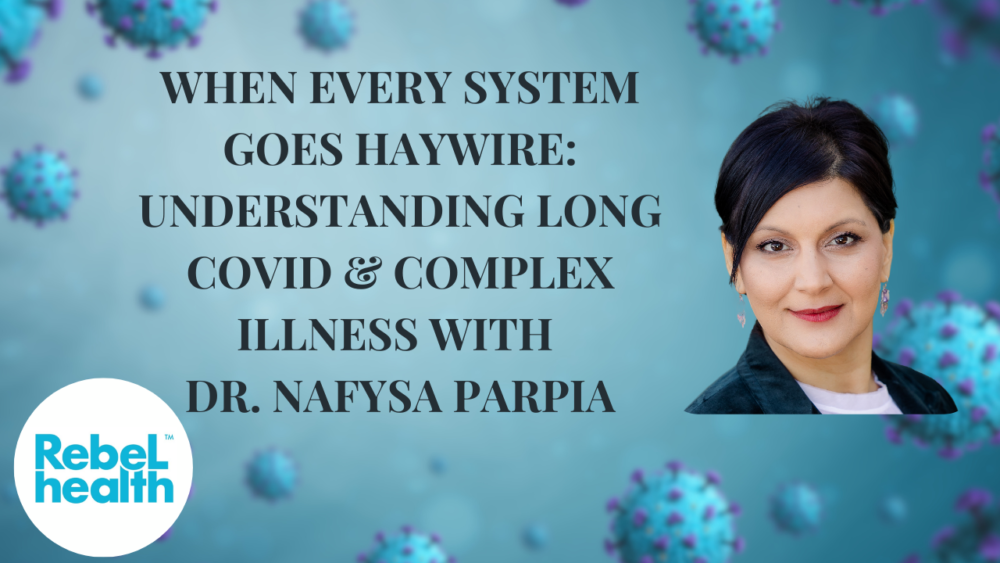Video Transcript
Jason Boyd: Hey, what’s up everybody, Jason Boyd with Bio+Logical Health & Nutrition. And I’m sitting here with my good friend, Dr. Regina van Berg. Today, we’re going to be talking about boundaries. So a few weeks ago I wrote an article about relationships and how when I talk with clients about getting them on board a healing program that one of the first things that I need to discuss with them is this idea of speaking to their significant other, their partner, whoever’s in the household that they need to be on board with them to help them and at the very least not stand in their way.
Jason Boyd: And so what that really means is that a person needs to start setting boundaries. And I find that it’s just not really a thing that most people are even aware of or are very comfortable doing. And it seemed to kind of garner a lot of attention and quite a few people have reached out to me privately asking, “What do you mean here talking about my boundary?”
Jason Boyd: So, Dr. van Berg here is an expert in that. And I personally have been kind of working with her both professionally and personally on some issues and as well as some projects together. And so I thought it’d be a really good idea to bring her on board, introduced her to everybody, but maybe have a discussion on boundaries and let her ask me, I suppose how it goes in therapy, but this is an actual therapy. So anyway, I’ll let you introduce yourself and we’ll get to it.
Regina van Berg: I’m Regina van Berg. I am a licensed clinical psychologist. My specialty is trauma treatment, and I’m also a practitioner and a clinical researcher of mindfulness-based interventions.
Jason Boyd: Awesome.
Regina van Berg: Lots I could do with my time.
Jason Boyd: Yeah, very cool stuff-
Regina van Berg: It is cool stuff.
Jason Boyd: And so Dr. van Berg and I had been working on some things as I’ve said, and we’ll be bringing that to you. But for today we’re going to be discussing boundaries. So first of all, what are they? I’m going to let Dr. van Berg here kind of run the show a little bit so she can go through the whole thing and then I’ll just answer the questions.
Regina van Berg: Okay. So you led with boundaries have been something you’ve been writing about.
Jason Boyd: Mm-hmm (affirmative).
Regina van Berg: The people that are in your community reading these posts are really kind of involved and engaged in these types of writings. And you’ve also mentioned that personally, this has been a bit of a growth edge for yourself as well.
Jason Boyd: Right.
Regina van Berg: Maybe tell me a little bit more about how did it come to be that you are thinking and writing about boundaries right now?
Jason Boyd: So yes, historically speaking, I have not been terribly efficient at setting boundaries or holding boundaries. And so it has caused problems in my life. I have found that I tend to try to be a peacemaker. Try to maintain balance, try to just kind of keep things on an even keel. And I have found in my desire to keep the peace and not upset other people by asking of them things that I want or need, it actually ended up creating more conflict. So I have learned that’s on me. That’s nobody else’s fault. That’s my fault. So I need to do some work on that.
Regina van Berg: First, let me reflect back, and I think that this is a really common experience that we don’t necessarily set boundaries because we think that perhaps doing so it would be selfish.
Jason Boyd: Right.
Regina van Berg: Or perhaps I’m not maintaining my role as a significant other or a parent, whatever by acknowledging you’re saying, “There’s things that I want and need.” So we maybe find ourselves in this caregiving role. We find ourselves perhaps not practicing or stepping back from setting boundaries because we think in some way we’re inconveniencing or harming another person.
Jason Boyd: Right. Or it’s just easier. Like, in my case sometimes I think it’s just easier to just do it, just do the thing or not cause any problems or whatever. Just…
Regina van Berg: Absolutely. Right. So it’s on the one hand, this idea of kind of caretaking and then maybe we also have this idea that I kind of shouldn’t need the help.
Jason Boyd: Right.
Regina van Berg: I should just be able to do it. So we’re trying to keep the peace and really what we’re doing is creating a different type of distress.
Jason Boyd: Yes.
Regina van Berg: Perhaps the distress is not in the relationship now. Perhaps it’s not in the situation, but it surely is felt when I need or wants a thing and for any number of reasons decide not to make that known.
Jason Boyd: Right. And so in addition to not setting boundaries, I have also historically been a person that does not ask for help. I think I just can handle everything by myself and take it all on. And then again, ultimately what happens is I get stressed out and it feels overwhelming sometimes and then I get upset and there is no peace.
Regina van Berg: Right.
Jason Boyd: And that’s my fault.
Regina van Berg: Right. And I admire and appreciate being accountable. Boundary setting very much is an active process and it’s a process that we individually own. But I also want to make sure that we’re making plenty of space here for the fact that this is challenging. And there are a lot of reasons why we might have come to the point where we think the way that we’re thinking about boundaries. So it could be culture, it could be something having to do with gender rules-
Jason Boyd: Right.
Regina van Berg: Right? We come to this honestly, we come to it honestly.
Jason Boyd: Yeah, that’s a good point.
Regina van Berg: One thing that you and I have been talking about and I want to bring it up here just to kind of get your feedback on it, but we’ve been discussing quite a bit lately that boundary setting and requests are actually the same thing. If I want to set a boundary what I’m doing in practice, right. If I operationalize what that is, I’m making a request of someone. When we think of it that way… Well, let me take one step back. What’s it like to think of it that way? The boundary setting and request making are, this is part and parcel of the same.
Jason Boyd: My heart starts to beat a little bit-
Regina van Berg: Yeah. Okay.
Jason Boyd: Because yeah, I don’t want to inconvenience anybody.
Regina van Berg: Yeah. So you don’t ask for anything.
Jason Boyd: I don’t ask for anything.
Regina van Berg: And then there’s this element of vulnerability isn’t there.
Jason Boyd: Absolutely.
Regina van Berg: What if I do ask? What if I do say, here’s the thing that I need? And the party receiving my request decides, nah.
Jason Boyd: Right. So forth… How I feel about myself or how I feel that that person feels about me, I think.
Regina van Berg: Okay. Yeah.
Jason Boyd: So those are two separate thoughts there. I’m completely independent. I guess the reality of what exactly what you’re saying is if I’m asking my significant other for a thing and they deny that thing, as long as it’s a thing within reason, obviously-
Regina van Berg: Sure.
Jason Boyd: … and they say no, then what does that say about how they feel about me or our relationship? It feels like it’s an attack on the relationship or perhaps there’s no love. That’s hard.
Regina van Berg: That is hard. That is hard. And maybe let’s unpack that for just a moment because I think that’s really important. It’s a vulnerable process by definition. And one of the things that you’re talking about and you’re talking about with your clients is you perhaps historically there was no boundary setting happening.
Jason Boyd: Right.
Regina van Berg: So now all of a sudden if I’m like, “Well, here’s a boundary love,” and that person has a reaction, I might find myself interpreting in my mind, “Oh, what does that mean?”
Jason Boyd: Right.
Regina van Berg: “What does that mean about me? What does it mean about the situation that we are creating between the two of us?” And that depending on the request and depending on other features of that situation, it may mean that there is a lack of consideration.
Jason Boyd: All right.
Regina van Berg: It may mean that there’s something perhaps not functioning in the relationship. And depending on context, it could also simply mean that this person also isn’t very practiced at hearing and then responding to that boundary in some productive way.
Jason Boyd: Right.
Regina van Berg: Right. Now, only you will know what’s happening in that. We can’t speak in terribly broad strokes here, but our mind is very likely to go to that place of, “Ah, shoot, what just happened?” Right?
Jason Boyd: Right.
Regina van Berg: So it’s challenging and perhaps for good reason.
Jason Boyd: Okay. So if I’m hearing what you’re saying there it’s, well, we need to be careful, I guess in how we then respond when we set the boundary. Right. So we can ask again as long as it’s within reason or not, “Hey, come puff paint out of a paper sack with me somewhere.” It’s pick up your shoes, do the grocery shopping, do a thing, whatever. And well, no, so let’s keep this within the realms of maybe like a health program or something. I have to change my diet and that’s going to mean fixing several different meals if everybody’s not on board to kind of eat the same thing or something.
Jason Boyd: And if that person says no, I can imagine that what that feels like to the person is, “Well, you don’t love me, you don’t care about me, my health,” or whatever. So that’s a big deal. And now it’s also especially a big deal I guess if you are not, as you said, good or practiced at asking and setting boundaries. So we can also feel perhaps new if this person is used to getting away with a thing for a very long time and now you watch the video and listen to Dr. van Berg and you decide, “I’m going to start asking, I’m going to start standing up for myself or setting a boundary,” and then it comes out of nowhere. It seems like, and then there’s a little bit of pushback. So the first step then is going to be in an asking.
Regina van Berg: Setting the boundary.
Jason Boyd: Set the boundary.
Regina van Berg: Here’s the boundary, here’s the thing that I need, here’s my request. And I think perhaps this is a really important point too. I alluded to it a moment ago, but maybe let’s talk a little bit further about this. I’m going to make a request, I’m not going to make a demand.
Jason Boyd: Right.
Regina van Berg: As a consenting grown adult, you have every right to say to my request either, “Yes, I am willing or no, I am not.”
Jason Boyd: Right.
Regina van Berg: Right. And then as the person setting the boundary, it comes back on me to own that process and say, “Let me think about this.” I always hesitate because it seems extreme. I think there’s two ways to deal with that, right? The first is I can accept your no.
Jason Boyd: Right.
Regina van Berg: Right. I think about how important was that request to me? Is this a series of a long pattern of me making requests and them constantly not being honored.
Jason Boyd: Right.
Regina van Berg: Or am I actually okay with this? In the grand scheme of things, can I roll with it? Now, can I roll with this very… We mean it, Right? It means I’m not resentful. It means that I’m not going to bring this back to you later and punish you for it.
Jason Boyd: Okay.
Regina van Berg: It means that I am going to take this no, and move forward with true acceptance. Okay? Now, if I sit with your no and I decide you know what, I’m actually not okay with that. That’s not something that I can accept in this moment. It’s on me now not to force the person into compliance. That’s not how boundaries work, right?
Jason Boyd: Okay.
Regina van Berg: Now, I’m violating their boundary.
Jason Boyd: Good point.
Regina van Berg: But to then change my behavior, my thoughts to accommodate for that no. It could be as simple as I’m going to change my behavior to work around that no, or it could be, I now need to leave the situation because this no is that unacceptable to me.
Jason Boyd: Okay.
Regina van Berg: Yeah.
Jason Boyd: Good point. And so there’s always a workaround. Yeah.
Regina van Berg: Usually depending on the request, right. If the request is, “Don’t perpetrate violence against me,” and you say, “I’m not going to honor that request.” There is no workaround.
Jason Boyd: Right.
Regina van Berg: Right.
Jason Boyd: What if it’s, “I need to just cook one meal for the whole family.” “No, I can’t do that for you.” “Okay, well, then here’s what I’m going to do. I’m going to cook my meals and you’re going to cook your meals.”
Regina van Berg: There’re workarounds. Right. Made the request, the request has been denied. Here’s the change in my behavior.
Jason Boyd: You’re right.
Regina van Berg: Absolutely. Right, and again, you may get pushed back. It happens. It happens, but I think when we bear in mind this idea that boundary setting and requests making are similar, all I’ve done is make a request. I haven’t injured you, I haven’t harmed you in some way and I’m honoring your no. Okay, here’s my workaround. It’s always, of course, possible to get to that place where I don’t accept that no and that might feel harder, that might be trickier when you realize, “Okay, for this one, maybe there is no workaround.”
Jason Boyd: Right.
Regina van Berg: That’s a hard place to be in for sure.
Jason Boyd: Yeah. I think for me personally, as somebody who does not like to upset the apple cart, so to speak, it’s such a foreign concept, it really is to ask for help and to request a thing, to set a boundary. Now, I’ve asked before about certain things and that’s one thing. And sometimes the asking comes out of frustration, which comes out of a fight that ensues because typically I wouldn’t ask for a thing. And now here I am asking for the thing and it’s like, well, why are you asking for this thing now when you didn’t use to?
Jason Boyd: And so there’s a couple of things that I think are really important is that, one, when you start setting boundaries, if the person well within their rights as a consenting adult to deny that if they get angry, which was the thing I think that I was typically afraid of is angering somebody in setting a boundary or asking for thing. And anger that may be a strong word, but nonetheless, if a person’s reaction to that suddenly is negative, that’s not on me, that’s not on the person that asking it. That’s on the person not willing to hold it. And so I think that’s really important to bring out, especially for somebody who doesn’t or hasn’t typically set boundaries that they may encounter pushback initially and there could perhaps be a tendency to then shrink back again and then it just disable this whole boundary thing. It is not good.
Regina van Berg: Right. So I think that’s a really nice point, Right. If I offer this request and it’s denied, that’s evidence that we might be having a bit of conflict. It is not evidence that I’ve done a wrong thing.
Jason Boyd: Right.
Regina van Berg: Right. Their upsetness, their emotional state as a result of me making this request is not evidence that I have just done some kind of socially unacceptable thing.
Jason Boyd: Yeah.
Regina van Berg: Right. And this may be a bit off-topic, but I think this really interested me when you said it. You and I have been talking about function of emotion and how important that is. And just now I heard you say, “Sometimes I find myself not setting the boundary, not setting the boundary, not setting it. And then I’m resentful and then I set it.”
Jason Boyd: Right.
Regina van Berg: So let me ask you this question, and I’m wondering who else relates to this? What is the function of resentment? What is the data that that particular emotion is imparting to us?
Jason Boyd: Well, so I’m going to get hung up because I’ve written about resentment or I started writing about resentment and I’m a big word freak and the etymology of it means to feel anger again. So I think ultimately, so this is interesting because we have talked about this. I started to break down resentment and that’s why I went to the etymology of the word and it means to feel anger again. And I asked, “Why would we knowingly choose to feel anger again?”
Jason Boyd: My conclusion, and I am absolutely willing to be wrong on this, is that it takes the responsibility off the person who is angry to perhaps look at themselves or to address a situation. It allows them to continue putting something off on somebody else. So if I’ve done a thing and I’ve wronged somebody and then they feel angered by it and now they resent me, they can confront me. And if they don’t… I know. Okay. I’m probably [crosstalk 00:17:49]. All right. I’m going to shut up here and I’ll just-
Regina van Berg: I see what you’re going. I see her going and maybe this helps create the frame a little bit. So we’re talking about the meaning of resentment, which I will share how I usually talk about that in my work. But let me ask you this one. What is the data anger in parts? What does it tell us about what has just occurred in front of us or what we perceive to have just occurred in front of us?
Jason Boyd: A boundary violation.
Regina van Berg: It is a boundary violation. We experience anger when there has been a boundary violation or we perceive that someone or something has violated our boundary. So if resentment is to feel anger again in the context of boundaries, what happened?
Jason Boyd: They have crossed that boundary again.
Regina van Berg: We have repeated boundary violations and as we’ve discussed, and this is really challenging I think and I’ll own that maybe this is not challenging for other people, I think it’s a challenging idea. When we begin to find ourselves in that place of resentment, it very well could be that what’s happening is we are tolerating repeated boundary violation and on some level we are upset that we have not set the boundary, right? I am very frustrated. I’m very angry with what’s happening out here, but part of that also kind of feels maybe a bit directed inward because I am also not doing a thing to prevent the again and again part, right?
Jason Boyd: Right.
Regina van Berg: So if we’re setting the boundary out of resentment, where are we in that process already?
Jason Boyd: Right.
Regina van Berg: Right?
Jason Boyd: Yeah. And so that’s a really great point because that is the thing that has been an issue and again, that’s the thing that I’m going to own is that in not wanting to upset or ask for help or whatever it is, feel like I’m punishing or dominating or whatever by… And that may be interesting language that I’m choosing to use there too-
Regina van Berg: Yes.
Jason Boyd: … is that I feel like am I being controlling? Am I being dominating by asking a simple request? That’s how it feels to me. It feels big, and so in not doing that, desiring to try and just keep peace and being like, screw it, I’ll just deal with it on my own, I’m getting upset. And then-
Regina van Berg: And tell me that upset. What emotion is it?
Jason Boyd: Anger.
Regina van Berg: Thank you. Good. Yeah.
Regina van Berg: And the boundary violation that did not occur because I never said it, right? And so that is any, I guess, argument that arises out of that primarily that’s going to be on me because if this is a thing that wasn’t problem before and now suddenly I’m asking the thing, right. So I guess what I really liked, one of the many things I like about this, about learning how to set boundaries is that it actually has the ability to bring people together.
Jason Boyd: Right.
Regina van Berg: Because now you’re starting to… A couple of things. You’re showing that you value yourself and that you have limits that you care about yourself and you are expecting another person to honor those as well. And so that, I think there’s that reciprocity that can happen there. So it actually has this ability to bring people together when there’s a good understanding of what I’m going to accept and allow and what you’re going to accept and allow. And then when we know that and there is no crossing of those boundaries, then suddenly…
Jason Boyd: Right. Right.
Regina van Berg: It’s too loud. I think that’s a really nice point. Sometimes we hesitate to set and hold a boundary because we think we are putting divisions between ourselves and other people. And I think that we story it that way a lot in culture and in all kinds of ways. But you’re absolutely right. If I set and hold good boundaries, I’m treating myself well, I’m telling you very expressly, “This is how you treat me well. And now we have this relationship where the two of us are getting the things that we need. The two of us have this way of communicating.” And what a beautiful thing to set forth a boundary, to put that request out there and have a loved one say, “Yep, I’m on board.”
Jason Boyd: Right.
Regina van Berg: Right. What that must feel like.
Jason Boyd: Right.
Regina van Berg: Right.
Jason Boyd: I value you. I value our relationship and how wonderful too for children to see that.
Regina van Berg: Right.
Jason Boyd: To see open communication and clear indications of what’s acceptable and what’s not and two people honoring that.
Regina van Berg: Right.
Jason Boyd: Because as I don’t need to tell you, but I’ll tell you, these are things that we learn from modeling the behaviors of our caretakers. And so if our caretakers historically have not been good at doing a thing, then how can we expect the children to do that thing? And I also want to be clear in case my mom and dad are watching this out there this lack of boundary setting is not their issue. That wasn’t a thing. This was a really weird thing that I kind of came up with on my own when I was about 10 or 11 years old. And it’s a story that I’m about to get into, but it was just a cool thing that I found that I thought, “Oh man, I can do anything and that’s just how I’m going to live my life.”
Regina van Berg: Sure.
Jason Boyd: And so that has caused a bit of a problem later on.
Regina van Berg: That’s a really important point. And maybe this is our last point as we are about out of time here.
Jason Boyd: Yeah. For sure.
Regina van Berg: But I think sometimes we don’t set boundaries because we don’t think that we have the value or the worth or the right to do so. Sometimes we don’t set boundaries because we think that’s the right thing. Right? And potentially, we’ve already kind touched on this, but I just kind of want to frame that too. Right. We come to this in a lot of different ways and then fundamentally at the root of my practices, we’re all doing our best for it all the time. And this takes practice. It does. Go easy on yourself.
Jason Boyd: Yes.
Regina van Berg: Go easy on yourself.
Jason Boyd: Good point.
Regina van Berg: It’s okay to practice.
Jason Boyd: It is. Take your time. Practice, be kind to yourself. Yeah. I have nothing more to add to that. So just to recap ask, hold…
Regina van Berg: Set and hold the boundary.
Jason Boyd: Pretty simple, Right.
Regina van Berg: That’s what you’ve heard today.
Jason Boyd: Yeah. Okay. Yeah. Getting a little long here. So we’re going to end. Thank you so much for watching. You will be seeing more of Dr. Van Berg and I as we have plans putting out some more videos and some programs that we’ve been working on for quite a while that I’m really excited about. Also, she is kind of my practitioner and I am kind of her practitioner a little bit. We’re helping each other out on some things.
Regina van Berg: I’ve just started my protocol.
Jason Boyd: And… Yeah.
Regina van Berg: Yeah.
Jason Boyd: That’s really exciting. We’ll be updating on that as well. Otherwise, I always have to say this, do not go looking for Dr. Van Berg online because she doesn’t exist. She does not do social media or anything else. She has her own private practice, which keeps her very busy and she just does not have the time for that. I ignore, I think the desire, right [crosstalk 00:25:18].
Regina van Berg: Yeah, I just-
Jason Boyd: [inaudible] you just don’t have the desire and I respect that. I don’t want to speak for you, though. I know-
Regina van Berg: This has never been my cup of tea. I like one-on-one.
Jason Boyd: Yeah.
Regina van Berg: Intimate interaction.
Jason Boyd: Right.
Regina van Berg: It’s just my preference.
Jason Boyd: That’s a fair point. I just know people are going to go start looking you up on Facebook or Instagram and they’re not going to find you.
Regina van Berg: That won’t work well.
Jason Boyd: But you will be seeing more of her soon. We do have some really exciting things to be putting forth here soon, and so look for that. And as always, happy to engage in any questions or comments afterwards and look forward to a good discussion. Thank you so much.
Regina van Berg: Thank you. Bye [inaudible 00:25:59].
Jason Boyd: Bye.



























